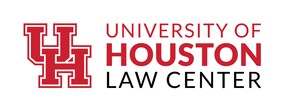HOUSTON, May 29, 2015 /PRNewswire-USNewswire/ -- University of Houston Law Center professor David Crump has found time between lectures and grading exams to craft his fifth novel, "Sudden Death Overtime," a courtroom thriller involving terrorists and the international financiers who bankroll them.
"I'm unusual in academia, maybe, because I practiced law for many years, ran a docket, and tried both civil and criminal cases," said Crump who joined the Law Center faculty in 1988 after years as a Harris County prosecutor and civil trial lawyer for firms in Dallas and Houston. "That experience is packed into this novel."
The plot unravels the mystery of who financed the three extremists who detonated a bomb in a packed football stadium killing more than 100 spectators. When called upon by families of the victims, the task seems too much even for Houston attorney Robert Herrick - the "Lawyer for the Little Guy" - Crump's signature character in each of his novels. But he reluctantly takes on the case to follow the money whether it leads to banks, foundations, governments or wealthy ideologues. In the process, his own life is at risk.
Though a mystery thriller, Crump insists the book also serves to inform the public about the true nature of the legal system and the people who practice in it, which is often distorted in popular fiction.
"This novel is different," Crump said. "The story takes you through a big case, step by step, and it authentically shows the law and lawyers at work. You can watch the lawyers struggling with Supreme Court cases that set the requirements for the complaint. And you can see the other side react.
"You can follow the lawyers as they ask questions in depositions and struggle with evidence rules about hearsay and expert testimony. You observe as the lawyers use opposing tactics in jury selection, witness examination and final arguments. And there are realistic malpractice and ethical concerns about issues like keeping big numbers of clients informed and dealing with conflicts.
"This isn't your children's courtroom drama. It wasn't written by John Grisham."
"The reviewers have recognized the realism in my books," Crump said. "My favorite quotation from one review said that you couldn't get a clearer picture of how a big case is tried 'if you were sitting in the front row of the jury box.' "
Crump feels so strongly about the real-world educational value of his novel that he has proposed the Law Center host a Continuing Legal Education (CLE) program for practicing attorneys to explain and offer practical advice about sequential events in a large, multi-plaintiff litigation as outlined in the novel.
Crump, who teaches Civil Procedure and Constitutional Law, in addition to Criminal Law and Evidence, is also a prolific writer of scholarly articles and books. But writing fiction did not come easily.
"When I started on my first novel, 'Conflict of Interest,' I thought I had enough experiences, enough funny happenings, and enough disaster stories to write a novel. Man, was that wrong!" he said.
"There are strategies, methods and a whole strange craft about writing a novel. I got turned down everywhere with my original manuscript. I couldn't even get an agent. So, I went to seminars, attended writer's conferences and read books about how to do it. Then, I took a year to rewrite the entire thing. I finally got it published, and I felt like I'd won the lottery.
"A novel isn't about knowing the subject, although that helps," he continued. "It's about Conflict! Conflict! Conflict! among the Characters! Characters! Characters! The conflict has to grow out of the characters, in a credible way. And it has to persist until the end, in a way that some writers about writing have described as keeping the characters in a crucible.
"And so, while my novels are realistic, I think, and it's important to me for them to be realistic, I always have to keep in mind that readers aren't asking themselves, what am I going to learn from this book? Instead, they're looking only incidentally at that - they want an intriguing setting and details - but they're mainly watching what conflicts the story is going to describe, and what the characters are going to do about them."
"Sudden Death Overtime" is available on Amazon along with his previous novels,"Conflict of Interest," "The Holding Company," "Murder in Sugar Land," and "The Target Defendant."
University of Houston Law Center Media Contacts: Carrie Anna Criado, UH Law Center Executive Director of Communications and Marketing, 713-743-2184, [email protected]; John T. Kling, UH Law Center Communications Manager, 713-743-8298, [email protected]; or Stephen B. Jablonski, Multimedia Specialist, 713-743- 1634, [email protected].
About the University of Houston
The University of Houston is a Carnegie-designated Tier One public research university recognized by The Princeton Review as one of the nation's best colleges for undergraduate education. UH serves the globally competitive Houston and Gulf Coast Region by providing world-class faculty, experiential learning and strategic industry partnerships. Located in the nation's fourth-largest city, UH serves more than 40,900 students in the most ethnically and culturally diverse region in the country.
About the University of Houston Law Center
The University of Houston Law Center is the leading law school in the nation's fourth-largest city. Founded in 1947, it is a top-tier institution awarding Doctor of Jurisprudence (J.D.) and Master of Laws (LL.M.) degrees. The Law Center is fully accredited by the American Bar Association and is a member of the Association of American Law Schools.
Logo - http://photos.prnewswire.com/prnh/20150327/195030LOGO
SOURCE University of Houston Law Center
Related Links
WANT YOUR COMPANY'S NEWS FEATURED ON PRNEWSWIRE.COM?
Newsrooms &
Influencers
Digital Media
Outlets
Journalists
Opted In





Share this article